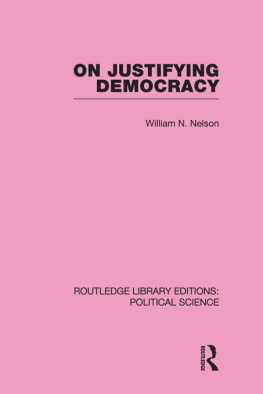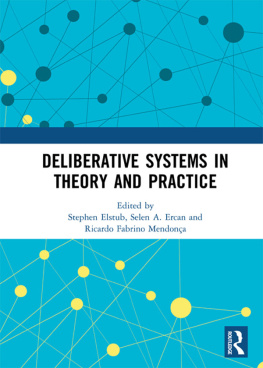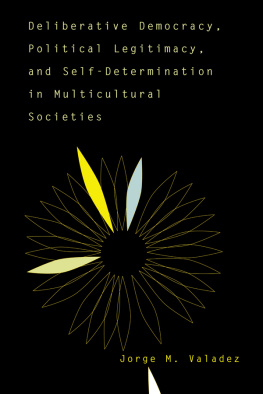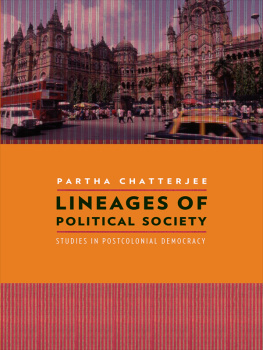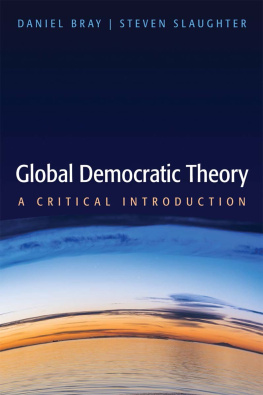Framing Democracy
Framing Democracy
A BEHAVIORAL APPROACH
TO DEMOCRATIC THEORY
Jamie Terence Kelly

Copyright 2012 by Princeton University Press Published by Princeton University Press, 41 William Street, Princeton, New Jersey 08540 In the United Kingdom: Princeton University Press, 6 Oxford Street, Woodstock, Oxfordshire OX20 1TW
press.princeton.edu
All Rights Reserved
ISBN 978-0-691-15519-7
Library of Congress Control Number: 2012941111
British Library Cataloging-in-Publication Data is available
This book has been composed in Sabon
Printed on acid-free paper.
Printed in the United States of America
10 9 8 7 6 5 4 3 2 1
For Mia
Contents
Acknowledgments
THIS PROJECT has been a long time in the making, and so there are a great many people who deserve my gratitude, not all of whom can be listed here. As in all things, I must begin by thanking Marie and Josephine, my parents Jim and Lucia, and my sister Cassandra.
Reflecting back on the path that took me here, I realize how much my experiencesfirst as an undergraduate and then as a M.A. studentin Carleton Universitys philosophy department have shaped the way I think and write. In particular, I would like to thank professors Andrew Brook, Marvin Glass, Rebecca Kukla, and Richard Manning. With specific regard to this project, I realize now that conversations, arguments, and courses with students from the Institute of Cognitive Science have structured the way I think about empirical research and philosophical argumentation. I received a better philosophical education at Carleton University than I deserved, and for that I will always be grateful.
At Boston University, I was fortunate to find the guidance and tutelage of professors Hugh Baxter, David Lyons, Juliet Floyd, and David Roochnik, among others. In graduate school, one seems to learn as much from ones peers as from ones professors, and so I must thank all of my colleagues at BU for their support, friendship, insight, and encouragement. In particular, I wouldnt be who I am today without Timothy Brownlee, David Jennings, Anthony Reeves, and Matthew Schaffer. Further, I owe a huge intellectual debt to David Estlund of Brown University. His work has shaped the way I think about democracy, and his advice was invaluable in forming the arguments (at least the good ones) of this book.
Since my arrival in 2008, Vassar College has been enormously supportive of my research. Barry Lam provided me with important feedback and guidance on my manuscript. Maria Hhn was instrumental in steering the project to completion. The dean of the faculty, Jonathan Chenette, has been supportive at every turn, and the research committee has been unfailingly helpful. I would also like to thank all the students who participated in my seminars on Theories of Democracy in the spring semesters of 2009 and 2011. For their assistance with the manuscript, I thank Matthew Bishop, Benjamin Conant, Hannah Groch-Begley, and Julia Nethero.
For their insight and criticisms, I am grateful to the two anonymous reviewers for Princeton University Press. I also thank Rob Tempio and the whole editorial team at the press.
Finally, I am grateful for financial support provided by the Ontario Graduate Scholarship Program, the Social Sciences and Humanities Research Council of Canada, the Helen G. Allen Award from the Boston University Center for the Humanities, the H. B. Earhart Foundation, and the Elinor Nims Brink fund at Vassar College.
Introduction
BEHAVIORAL LAW AND ECONOMICS grew out of the larger disciplines of economics and legal theory as a result of a desire to incorporate insights from empirical psychology into theorizing about markets and the law.
There are of course important differences between economics, law, and democratic theory. Unlike democratic theory, economics and (to a lesser degree) law have important descriptive components. That is, both
Still, it should be noted that democratic theory is, when compared with other theoretical enterprises, a distinctively normative affair (I will not here concern myself with merely descriptive accounts of democracy). As a result, the motivation to develop a behavioral approach to democratic theory cannot be premised merely on a desire to provide a more accurate description of democratic decisions. Descriptions of this sort are quite alien to democratic theorists, especially those of a philosophical bent. Instead, looking to psychology and other social sciences for insight into human behavior must be understood as being geared toward achieving democratic theorys normative goals. Behavioral democratic theory must be interested in bounded rationality as means to arrive at a better understanding of the moral consequences of democratic government.
This, however, is where things get complicated. The notion of a unified enterprise of democratic theory is but a useful conceit. In truth, there is no one democratic theory but rather a huge proliferation of theories of democracy. As a result, understanding the moral implications of a behavioral approach to democratic theory will require us to consider a wide range of theories of democracy and show how the rejection of the rational actor model affects each of them. Further, the implications of adopting a picture of humans as boundedly rational depend heavily on which bounds we consider. There is currently much controversy regarding how best to understand the heuristics that characterize human decisions and regarding which ones ought to count as biases. As a result, the case for behavioral democratic theory is complicated both by the number of democratic theories and by disagreements regarding the nature of the biases that characterize human decision making.
In response to these two complications, I will narrow my focus. First, in response to the variety of extant theories of democracy, I choose to focus my attention on judgment-based theoriesthose that construe votes as judgments about the common good (or collective interest), rather than as individual preferences over electoral outcomes. The key difference between judgments and preferences is that judgments can be either correct or incorrect (e.g., true or false), whereas preferences are simply reports (usually taken to be veridical) about individual attitudes. Thus, I will spend much of my time dealing with theories of democracy that construe democracy as an attempt to get at the truth about political matters, rather than as the interaction of brute preferences. Further, in order to organize these judgment-based theories into a manageable set, I propose a taxonomy of democratic theories that ranks them in accordance with the amount that they demand from the judgment of citizens. Preference-based theories of democracy will factor into this ranking (at the minimalist end of my ranking), but they will play a relatively minor role in the overall analysis.
Second, in response to the range of different cognitive biases that may be relevant to our understanding of democracy, I choose to focus on only one: framing effects. Very generally, a framing effect occurs when different but equivalent formulations of a problem result in substantively different decisions being made. Thus, our susceptibility to framing effects reveals that our decisions are not invariant across equivalent formulations of the same problem.social scientific literature on framing effects should inform our understanding of democracy. More specifically, I will show how various theories of democracy ought to respond to framing effects. In what follows, I provide an outline of the contents of each chapter.
Next page







